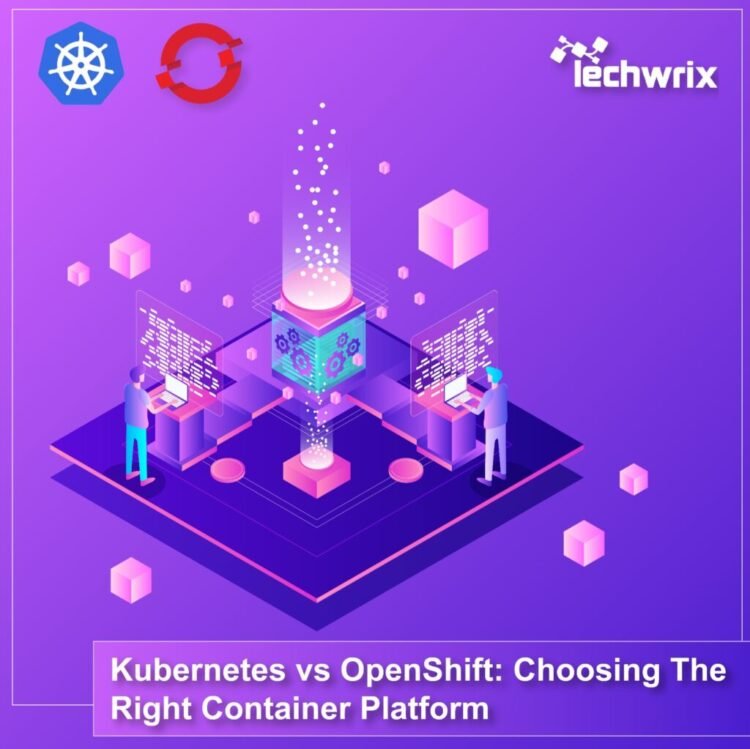Containers are a big deal today. They are software units that contain all the code, runtime, and dependencies required to run a distributed application. Thus, containers help engineers test and run apps without compatibility issues on any device and platform.
Kubernetes and OpenShift are two major players in the container management space, each offering unique advantages and challenges.
Kubernetes vs. OpenShift: Choosing the Right Container Platform
There is often confusion surrounding Kubernetes and OpenShift, despite 90% of organizations using containers in production. For example, Kubernetes is sometimes referred to as an all-in-one containerization platform. As this guide will reveal later on, that’s not true.
OpenShift also markets itself as a Platform-as-a-Service (PaaS). Yet it comprises Kubernetes components and works with Docker.
So, before we investigate the differences and key features between the two platforms, let’s have a sneak peek introduction “what you really need to know”.
Introduction: Beyond the Basics — What You Really Need to Know
Kubernetes and OpenShift dominate container orchestration conversations, but here’s the problem: most comparisons only scratch the surface. They’ll tell you what each platform does, list features, and throw around some benchmarks. But they won’t tell you:
- The hidden costs your team might face (time, talent, tooling)
- Which platform fits your DevOps reality (not just a generic checklist)
- When you should walk away from both, and use something simpler
In this guide, you’ll get all of that and more.
We’ll cover the essential definitions, yes. But we’ll also dive deeper into real-world scenarios, financial and operational trade-offs, and honest advice few others are willing to give. Whether you’re a bootstrapped startup, a mid-sized SaaS, or a Fortune 500 enterprise, by the end of this article, you’ll know exactly which path to take, and why.
Read more: Virtualization vs. Containerization: A Comprehensive Guide
What is Kubernetes?
Kubernetes is a free, open-source container orchestration platform currently maintained by the Cloud Native Computing Foundation (CNCF) and the leading containerization tool in the industry. Cloud providers like Amazon Web Services (AWS), Google Cloud Platform, IBM Cloud, and Microsoft Azure include Kubernetes in their packages. Kubernetes is a container management tool specialized in deploying, automating, and scaling applications.
Kubernetes Key Features
Here are the key features of Kubernetes:
- Kubernetes can run on any infrastructure, whether on the cloud or locally. Developers can work with their operating system of choice, storage engines, container runtimes, and more. It gives them ample flexibility, and they can integrate their apps into Kubernetes APIs.
- Kubernetes can constantly make repairs and has self-healing capabilities. It can address any failures that may impact an application’s integrity.
- You can schedule containers at scale, manage clusters, and care for your containers’ health over time.
- Kubernetes resolves issues tied to container proliferation and balances loads across pods.
- Kubernetes is highly extensible, with a rich set of APIs that allow developers to build custom controllers and operators to automate their own infrastructure and application management tasks.
Also Read: Introducing Kubernetes: An Open-Source Container Orchestration Platform
What is OpenShift?
OpenShift is a platform-as-a-service (PaaS) offering and a leading hybrid cloud app platform based on Kubernetes. It streamlines container app development and provides a set of tools and services to reorganize application development lifecycles. OpenShift provides dedicated support and features a complete mix of incorporated cloud-native, virtual, AI, and traditional solutions.
Developed by Red Hat, OpenShift is written in Go and AngularJS. It supports Java, Go, Node.js, Python, PHP and Ruby, but it can be extended to support other programming languages. OpenShift integrates easily with other DevOps tools, and it’s Open Container Initiative (OCI) compliant for container hosting and runtime. It can use Docker containers and as it is Kubernetes-based, will feel familiar to developers coming from those platforms.
OpenShift Key Features
OpenShift delivers these dire features to developers:
- Secure container app development on any cloud
- Multi-tenant networking and fine-grained controls
- Service mesh capabilities, integrated container scanning, hybrid cloud support, and built-in application monitoring and logging
- It can run stateful apps thanks to its persistent storage management features.
- OpenShift includes the Operator Framework, which simplifies the management of Kubernetes-native apps and automates routine tasks for maintaining application health.
- Full encryption for network traffic control plane and FIPS 140-2 Level 1 compliance
- OpenShift can competently use your resources and offers an excellent user interface.
- OpenShift has numerous automated workflows that you won’t get in Kubernetes
- Its source-to-image feature pairs finest with Docker Hub or Red Hat
- Offers seamless integration with CI/CD tools like Jenkins
- Provides role-based access controls (RBAC) and prevents account compromises
- Security rules like OAuth and IAM are created by default when you use OpenShift in your application environment. You don’t have to set everything up by yourself, as in the case of Kubernetes.
Read more: Red Hat Launches RHEL for AI and InstructLab to Democratize Enterprise AI
Kubernetes Vs. OpenShift: What Are the Differences?
Red Hat designed OpenShift as an enterprise-grade, open-source container orchestration platform. OpenShift packs additional security, productivity, and hybrid cloud features to meet that grade. Moreover built-in monitoring and enterprise-level security, the platform offers a self-service provisioning interface.
Here’s how Red Hat OpenShift compares with K8s.
| Feature | Kubernetes | OpenShift |
| Deployment | Works on most Linux OS and clouds | Requires RHEL, Fedora, or CentOS |
| Security | Manual setup for auth/security | Secure-by-default, strict policies |
| Support | Large open-source community | Enterprise Red Hat support |
| Updates | 4 releases/year | 3 releases/year |
| Networking | Requires plugins | Built-in Open vSwitch |
| Templates | Flexible Helm templates | Less flexible, fewer options |
| Image Registry | No built-in registry | In-built and DockerHub ready |
| CI/CD | Needs external tools | Jenkins included |
| User Interface | Complex, needs setup | Intuitive web console |
Real-World DevOps Personas: Who Should Use What?
Kubernetes is ideal for cost-conscious teams needing flexibility and scalability. It tops in multi-cloud setups and works well for advanced users who want full control.
OpenShift is best suited for enterprises seeking built-in security, compliance, and hybrid cloud capabilities. It simplifies container management and streamlines production deployments.
Many organizations adopt both, using Kubernetes for development and OpenShift for production environments, gaining the best of both worlds.
Let’s put the above mentioned scenario in real-world persona and see how they fit in.
Startup
- Company: 5-person AI startup
- Needs: Control, speed, open-source flexibility
- Choice: Kubernetes “I’ve got the skills, I want the control.”
Enterprise
- Company: Regulated financial enterprise
- Needs: Governance, compliance, secure defaults
- Choice: OpenShift “Built-in security and support wins.”
Hybrid
- Company: Mid-sized SaaS
- Needs: Development agility + production stability
- Choice: Both “K8s for dev, OpenShift for production.”
The Hidden Costs No One Talks About
| Cost Factor | Kubernetes | OpenShift |
| Onboarding Time | Steep DIY curve | Easier, but Red Hat-specific |
| Talent Availability | Easier to hire for | Harder to find experts |
| Compliance | Manual setup | Built-in support |
| Tooling Integration | BYO everything | Comes bundled, limited flexibility |
| Support | Community or third-party | Included with Red Hat |
| Upgrade Risk | Manual upgrades | Guided upgrade workflows |
When Not to Use Either
Not every project needs Kubernetes or OpenShift. In fact, using them too early can cost you time and money.
Avoid Both If
- You’re a small team with no DevOps
- You need fast MVP deployment
- You’re building serverless apps
- You want zero infrastructure management
Use These Instead
| Use Case | Alternative |
| MVPs | Heroku, Render, Railway |
| Serverless | AWS Lambda, Google Cloud Functions |
| Lightweight containers | Google Cloud Run, Fly.io |
Kubernetes vs OpenShift: The Verdict
Kubernetes offers unmatched flexibility but demands hands-on management. OpenShift simplifies many complexities but adds constraints and licensing costs. The right choice depends on your team size, skills, compliance needs, and how much you’re willing to manage yourself.
Choose based on what fits your reality, not what’s trending.
Kubernetes vs. OpenShift FAQs
Can OpenShift and Kubernetes work together?
Yes, OpenShift and Kubernetes can work well together. It is based on Kubernetes, so it automatically supports all Kubernetes workloads and APIs.
Can I use Docker without Kubernetes?
Yes. Docker builds, deploys, and runs container images without Kubernetes. Docker can run independently using Docker Hub, Docker Compose, and Docker Swarm.
What runtime does OpenShift currently use?
The Red Hat OpenShift Container Platform uses Container Runtime Interface – Open Container Initiative (CRI-O) as its runtime.
Can OpenShift replace Kubernetes or vice versa?
No. OpenShift extends Kubernetes. They are complementary, not interchangeable.
















